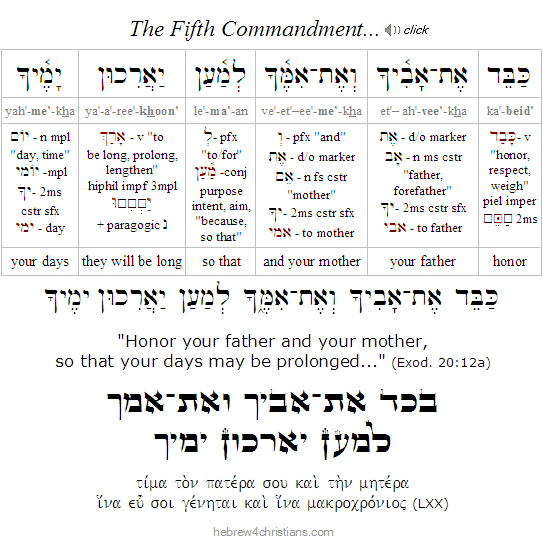|
|
|||||||||||||||||||||
 |
|||||||||||||||||||||
 |
|||||||||||||||||||||
|
|
||||||||||||||||||||||||||||||||||||||||||||||||||||||||||||||||||||||||||||||||||||||||||||||||||||||
|
The Fifth Commandment marks a transition from the first four (which have to do with our vertical relationship with the LORD) to the following five (which have to do with our horizontal relationship with others). The commandment to honor our parents is therefore basic to all other social relationships and is the foundation for decent human society. |
|
|
|
Rabbi Shimon bar Yochai said that "the most difficult of all the mitzvot is to honor your father and mother" (Tachuma, Ekev 2). There is no limit to the honor that is due to them, and often obedience to this commandment is taxing. The child must never shame his parents, never bring them any pain or heartache; never display anger toward them. |
|
The Blessing of Obedience |
|||||||
|
The full pasuk (verse) of the Fifth Commandment reads: |
|||||||
 |
|||||||
|
Honor your father and your mother, that your days may be long in the land that the LORD your God is giving you. |
|||||||
|
The reward for honoring your parents is long life. Conversely, disrespecting one's parents results in judgment from the LORD, even a shortened life (this is an example of midah k'neged midah (measure for measure) judgment). Devotion to one's parents is also a sign of respect shown to one's culture and identity, ensuring the perpetuation of both. Respecting your parents ensures that succeeding generations will accept the teachings of their elders, too. In Jewish tradition, this is sometimes referred to as kibbud Av v'Em, honoring your parents and their culture. |
|
Repeated in the New Testament |
|||||||||
|
The Apostle Paul quotes the Fifth Commandment in his letter to the Ephesians: |
|||||||||
|
Children, obey your parents in the Lord, for this is right. "Honor your father and mother" (this is the first commandment with a promise), "that it may go well with you and that you may live long in the land." (Eph 6:1-3) |
|||||||||
|
The Apostle is actually quoting from the second version of the Ten Commandments given in the book of Deuteronomy (this second version is said to include the text of the second set of tablets that Moses wrote). The repetition of the commandment includes the phrase, "so that it may go well for you": |
|||||||||
|
l'ma'an yitav lakha |
|||||||||
|
According to midrash, God knew that the first tablets were going to be destroyed, and He did not want the Israelites to despair that their hope for a good life would be shattered with these tablets. God then saved this extra blessing for the second set of tablets (Bava Kamma 54b). |
|||||||||
|
Esteeming Others |
|||||||||
|
The opposite of honoring others is disrespect, a form of unbelief that denies that others were created b'tzelem elohim - in the image of God (or rejecting the providential work of God in the world). Only by refusing to accept others as God's handiwork can people justify the atrocities they commit against their fellow man. |
 |
|||
|
Honor everyone. Love the brotherhood. |
|||
|
Of course the command to honor is made easier to fulfill if we live in honorable conditions, and parents, in particular, are commanded to ensure that children are taught to fear the LORD and become disciples of Yeshua (Eph. 6:4). The duty of children to honor their parents is not categorical, since it is assumed that the parent is not abusing his or her privileged position of authority. The same can be said of governmental authority, if that authority attempts to coerce us into disobeying God (Acts 5:29). Indeed, in countries that purport to be democracies, the honor to be ascribed to elected officials must be predicated on their integrity as representatives of the people. If an elected official, in other words, promotes godlessness or seeks to undermine those whom they serve in their position of trust, they have abandoned their God-given role and are subject to divine judgment. In such cases, the necessary evil of human government becomes a curse rather than a blessing...
|
|
|
|
|
|
|
Hebrew for Christians |
|||||
|
|||||



